PREVIOUS
Tamil Nadu Industrial Map Part - 03
August 17 , 2024
506 days
8320
0
Tamil Nadu Industrial Map Part - 03
(இதன் தமிழ் வடிவத்திற்கு இங்கே சொடுக்கவும்)
Handlooms and Power Looms
- The handloom sector is the largest cottage industry in Tamil Nadu, providing livelihoods to a significant portion of the rural population.
- The industry supports over 4.29 lakh weaver households and 11.64 lakh weavers in the state.
- The handloom sector is also crucial for producing cloth for government schemes such as the "Free Supply of Uniforms to School Children" and the "Free Distribution of Sarees and Dhoties Scheme."
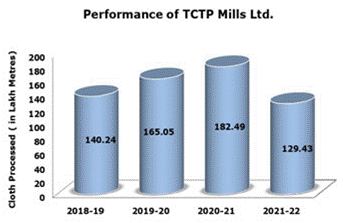
Heavy Industries in Tamil Nadu
- Tamil Nadu is one of India's most industrialized states, with a strong presence in heavy engineering and manufacturing.
- Bharat Heavy Electricals Limited (BHEL)
- Bharat Heavy Electricals Limited (BHEL) was established in 1956, marking the beginning of the heavy electrical equipment industry in India.
- In 1974, Heavy Electricals (India) Limited was merged with BHEL, further strengthening its presence in the sector.
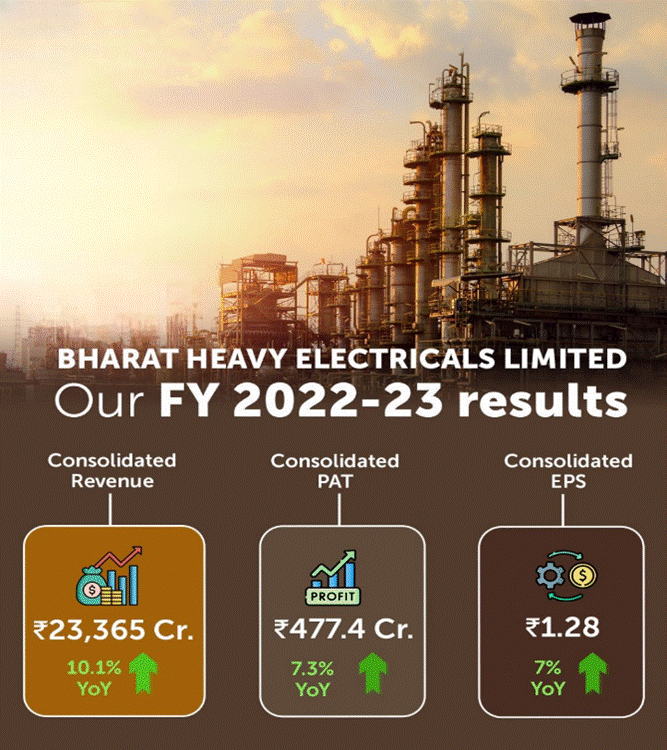
- Steel Authority of India Limited (SAIL)
- Steel Authority of India Limited (SAIL) is a central public sector undertaking based in New Delhi, under the Ministry of Steel, Government of India.
- SAIL plays a vital role in the heavy industries of Tamil Nadu and recorded an annual turnover of ₹105,398 crore (US$13 billion) for the fiscal year 2022-23.

- Sterlite Industries
- Sterlite Industries operates key facilities in Tamil Nadu, including a copper smelter in Tuticorin ((defunct now) ) and an aluminium plant in Mettur, contributing to the state's industrial diversity.
- Chennai Petroleum Corporation Limited (CPCL)
- Chennai Petroleum Corporation Limited (CPCL), formerly known as Madras Refineries Limited, is a subsidiary of Indian Oil Corporation Limited.
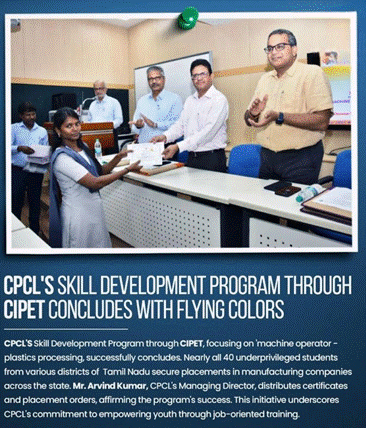
- Formed as a joint venture in 1965, CPCL is a state-owned oil and gas corporation with refineries located in Manali and Panangudi, making it a critical player in the energy sector of Tamil Nadu.
Environmental Protection
- The state has implemented the Hazardous Waste Treatment, Storage, and Disposal Facility (HWTSDF) at the Export Promotion Industrial Park (EPIP) in Gummidipoondi.
- Additionally, the State Industries Promotion Corporation of Tamil Nadu (SIPCOT) has initiated similar facilities in Thoothukudi and Perundurai.
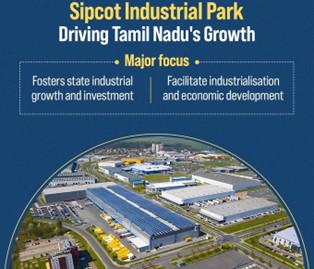
Other Key Industries
- Egg Production: Namakkal is one of the main sources of egg production in India.
- Nylon Nets (HDPE) Filaments: Karur is a significant manufacturer, contributing over 65% of India's production.
- Fireworks and Safety Matches: Sivakasi is a major production center, contributing over 60% of the country's fireworks production.
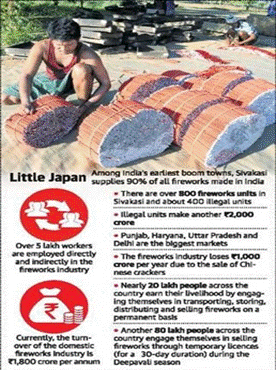
Electronics and Software
- Tamil Nadu has a growing electronics manufacturing industry, with many global telecommunications giants like Flextronics, Motorola, Sony-Ericsson, and Samsung setting up manufacturing hubs in Chennai.
- The state is also a major player in India's IT sector, being the second-largest software exporter in the country after Karnataka.
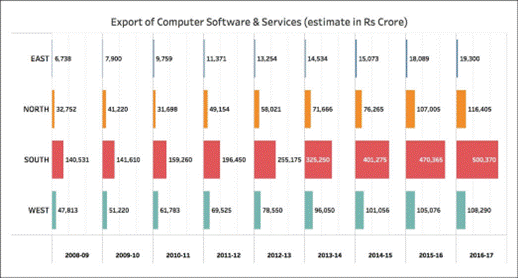
Leather Industry in Tamil Nadu
- Tamil Nadu plays a significant role in India’s leather industry.
- The state accounts for 70% of the country's leather tanning capacity.
- Additionally, Tamil Nadu is responsible for 38% of India’s leather footwear and components production.
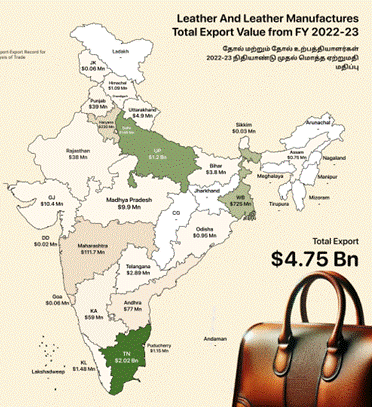
- The state's leather exports are valued at approximately USD 762 million, representing 42% of India's total leather exports.
Key Hubs:
- The leather industry is concentrated around Vellore, Dindigul, Erode, and nearby towns such as Ranipet, Ambur, Perundurai, and Vaniyambadi.
- Vellore district is a leading exporter of finished leather goods in India.
- It plays a crucial role in the country's leather and leather-related product exports, which include finished leathers, shoes, garments, and gloves.
Chennai's Role:
- Chennai serves as a crucial hub in the global leather industry, with many exporters and companies headquartered in the city.
- Tamil Nadu produces 70% of the leather in India and accounts for 30% of the country's leather exports.
Employment and Growth:
- The leather industry in Tamil Nadu employs around 0.5 million people, making it a vital sector for the state's economy.
- India’s leather and footwear industry is set for a robust growth hitting $47 billion by 2030 from the current levels of around $17.3 billion.
- The exports will more than double at $13.7 billion over the next six years.
Cities with their famous names:
- Ariyalur: Cement City
- Chennai: Detroit of Asia, Healthcare Capital of India, Capital of Medical Tourism, Banking Capital of India, Gateway of South India, Electronics Manufacturing Hub of India, Gateway of South India, City of Flyovers
- Coimbatore: Manchester of South India, Pump City, Engineering City of South India, Motor Sport Capital of India
- Cuddalore: Silver Beach City
- Dharmapuri: Mango Capital of Tamil Nadu
- Dindigul: Lock City
- Erode: Turmeric City, Yellow City
- Kanchipuram: Silk City, Temple City
- Karur: Textile Capital of Tamil Nadu
- Kanyakumari: Cape Comorin, Land's End of India
- Krishnagiri: Mango District
- Madurai: Temple City, Athens of the East, City of Jasmine, City of Festivals, City that Never Sleeps, Cultural Capital of Tamil Nadu
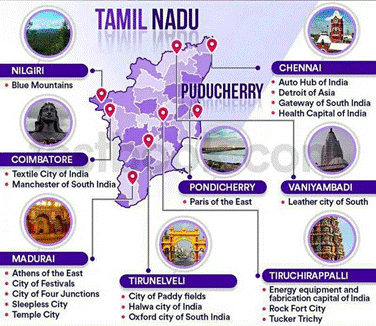
- Namakkal: Poultry Capital of Tamil Nadu
- Nilgiris: Queen of Hill Stations (Ooty)
- Pudukkottai: Granite City
- Ramanathapuram: Pearl City
- Rameshwaram: Pilgrimage City
- Salem: Steel City, Mango City, Geologist's Paradise, Mini London of Tamil Nadu
- Sivagangai: Heritage City
- Thanjavur: Rice Bowl of Tamil Nadu, Cultural Capital
- Tiruchirappalli: Rock Fort City
- Tirunelveli: Halwa City, Oxford City of South India
- Tirupur: Dollar City of India, Baniyan City, Knit Wear Capital of India
- Thoothukudi: Pearl City of India, Gateway of Tamil Nadu, Salt Capital of South India
- Yercaud: Poor Man's Ooty
- Kodaikanal: Princess of Hill Stations
- Kumbakonam: Cambridge of South India
- Sivakasi: Fireworks Capital of India" or "Little Japan"
Government Initiatives and Investments in Textiles
- To maintain its competitive edge in the textile sector, the Tamil Nadu government has introduced several policy incentives:
- Interest Subsidy for Spinning Modernization: In February 2024, the government introduced a 6% interest subsidy aimed at modernizing the spinning segment.
- The budget allocation for this initiative was set at INR 5 billion (US$59 million).
- This initiative aims to reduce capital costs and encourage the modernization of outdated machinery in the spinning industry.
- Special Capacity Subsidy: In 2023, the government increased the special capacity subsidy for technological textiles and MMF (man-made fiber) yarn made from recycled materials.
- The subsidy rate was raised from 15% to 25% for MMF fabric and apparel manufacturing.
- This move is in response to the growing global demand for technical textiles, which has surged since the COVID-19 pandemic.
Policies and Schemes to Support Businesses:
- Key Policies:
- Tamil Nadu Semiconductor and Advanced Electronics Policy 2024
- Tamil Nadu Ethanol Blending Policy 2023
- Tamil Nadu City Gas Distribution Plan 2023
- Tamil Nadu Electric Vehicles Policy 2023
- Tamil Nadu Aerospace & Defence Industrial Policy 2022
- Tamil Nadu Lifesciences Promotion Policy 2022
- Tamil Nadu Footwear & Leather Products Policy 2022
- Tamil Nadu FinTech Policy 2021
- Tamil Nadu Data Centre Policy 2021
Ease of Doing Business:
- Tamil Nadu has launched the Single Window Portal in 2021 to streamline the process for investors.
- This portal offers a one-stop solution for securing business-related approvals, licenses, and clearances.
- It provides access to over 200 services from more than 40 government departments and agencies.
- In 2024, Tamil Nadu has achieved impressive rankings across various sectors, reflecting its robust economic and social development:
- Sustainable Development Goals (SDG) Index: Tamil Nadu has emerged as one of the top performers in the SDG India Index 2023-24.
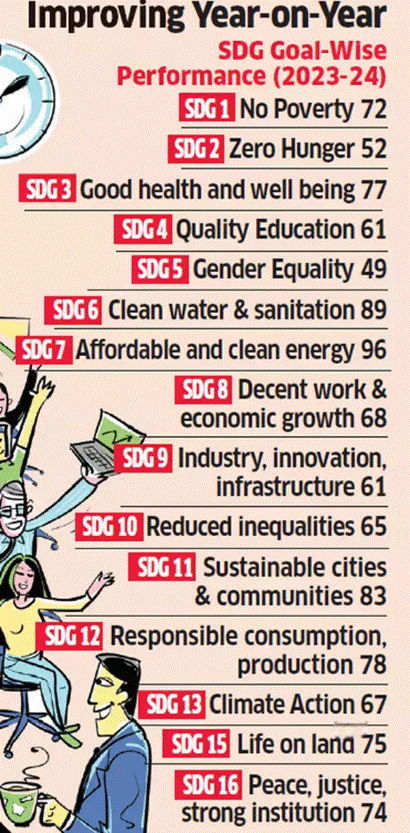
- The state ranked third with a composite score of 78, showing significant progress from its score of 66 in 2018.
- The state excels in multiple SDG categories, including decent work and economic growth (Goal 8), good health and well-being (Goal 3), and life on land (Goal 15).
- Cooperative Sector: Tamil Nadu ranks fourth in the number of Multi-State Cooperative Societies, with 126 societies.
- Maharashtra leads this sector, followed by Delhi and Uttar Pradesh.
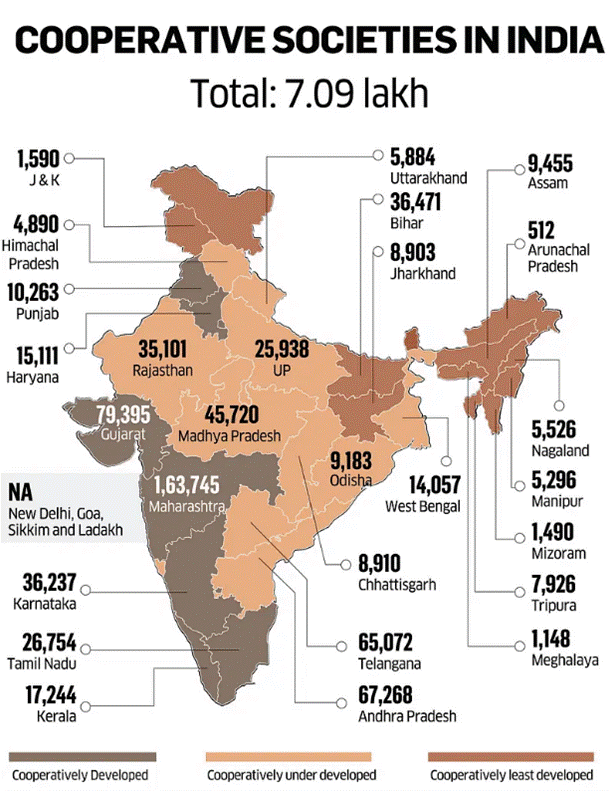
- Logistics: The state ranked second in the Logistics Ease Across Different States (LEADS) index for 2022, highlighting its strong logistics infrastructure and efficient regulatory environment.

- Healthcare: Tamil Nadu is a leader in healthcare, having achieved the UN’s Sustainable Development Goal target of a Maternal Mortality Ratio below 100 per 100,000 live births by 2020.
- The state also boasts a high institutional delivery rate of 97.18%.
- Telecommunication: Tamil Nadu is among the states with a tele density above 100%, demonstrating significant penetration of telecommunication services across both urban and rural areas.
- These achievements underscore Tamil Nadu's strong performance in promoting economic growth, healthcare, and infrastructure, contributing to its position as one of India's leading states.
Leave a Reply
Your Comment is awaiting moderation.


